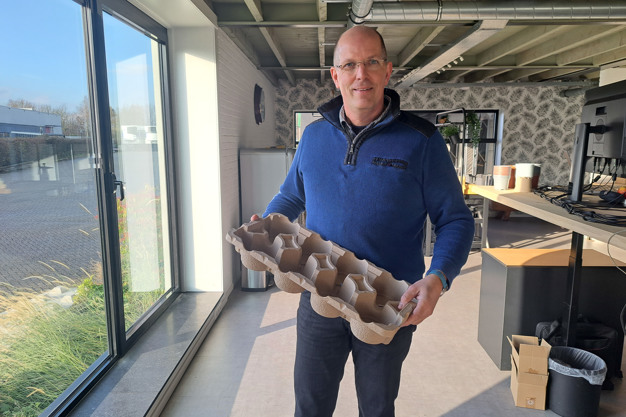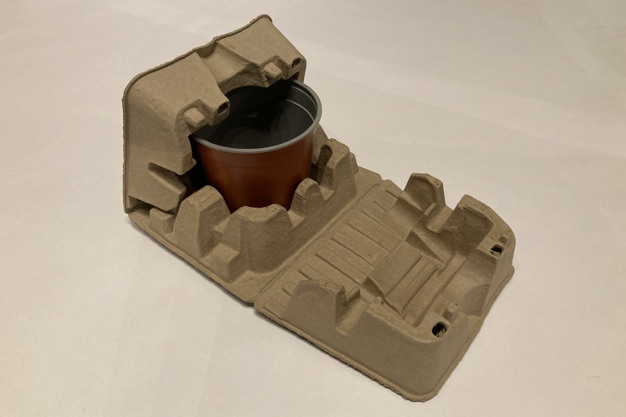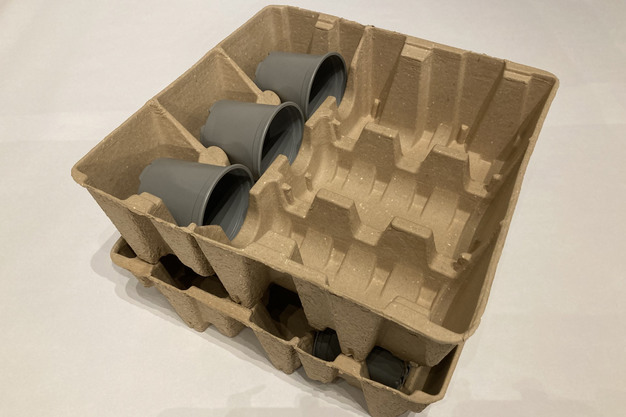For years, Modiform's R&D department has been developing plastic products like cultivation trays, packs, pots, and trays. Since late 2017, the Dutch company has also worked with alternative materials, particularly pulp products.
Gert-Jan Smal, a senior product consultant at Modiform, has been with the company for 25 years. He is involved in developing these products in conjunction with growers and automation. Gert-Jan has spent years working with plastic but now focuses on pulp products.
"We have various pulp products such as clam and blister packs and new transport trays. We also keep testing new products and materials because you have to continue developing and innovating to respond to regulations and customer needs," Gert-Jan says.

Pulp products are made from a mixture of cardboard and paper, which is turned into a liquid pulp and then hardened into shapes. Modiform currently uses wet-pressed and after-pressed processes to make these. Wet-press products are pressed on one side, while after-press products are pressed on both.
"Companies are becoming more environmentally conscious, and our clients expect sustainable products for a good price. But it must also function well throughout the chain. The switch from plastic to pulp hasn't quite met that last requirement yet. But over the years, higher taxes will likely be imposed on plastic, so that ratio will probably decrease. It's more important for Modiform to offer a wide product range so people can make the most sustainable choice for each chain. Also, more growers and retailers will change to pulp products more quickly," says Gert-Jan.
"The wet-pressed pulp products are still considerably thicker and rougher than plastic, so stacking and unstacking is usually still done manually. That thickness also means fewer products fit on a pallet. The new after-press-produced transport trays are robust and easy to unstack. Plus, growers, retailers, and online companies can use them in automated machines. Pulp products' strength means they can sometimes be sturdier than the same model made of plastic."

EE50101 - Clampack 1x pot 17cm (wet-press)
Modiform has noticed pulp products' sustainability and environmental friendliness make them increasingly popular in the packaging industry. The shaped cardboard and paper are 100% recycled and biodegradable, and the raw materials are sourced from renewable sources. The material is rougher but, therefore, less likely to sustain damage during transport. The transport industry already widely uses pulp products to transport glass.
"However, if the trays get wet during transport or on a Danish trolley, the pulp can collapse after a few days. But if you simply dry it in the sun, it becomes strong again, and you can use it. We often joke that customers should just sell their plants faster," says Gert-Jan.
Despite all the innovation and sustainability regarding alternative materials, plastic undoubtedly still has a place, Gert-Jan points out. "Various pulp products are being developed to reduce plastic use, but plastic can and should still be used. Used plastic should be washed and pulverized to make new products, creating a closed circle of reusability. Many people say all plastic should be banned, but that's impossible and not necessarily the most sustainable option. If you want to make everything from pulp, you need a ton of paper and cardboard. There aren't enough trees in the world for that," Gert-Jan explains. "And for every other replacement product, you also need many raw materials. Changing to more sustainable products, thus, remains a process. Each chain has different needs."
However, Gert-Jan adds that dealing with plastic products properly hasn't yet always gone smoothly in practice. There are still many places that do not reuse plastic. Also, waste processing plants in some countries cannot detect certain types of plastic. Taxes, regulations, and subsidies with sustainability goals are all things that encourage the reusing of raw materials. Those subsidies and regulations make companies more willing to become sustainable. Deposit schemes, for example, help consumers do the same.
"Kids often like looking for empty bottles to return to supermarkets for money. It's great to see how something small can increase awareness and that people are able to grow up with that idea. It's often something small that gets people thinking. Children who grow up with that will consider it later, too," Gert-Jan concludes.

EE50301AP - In-Box 3x pot 10.5 - 11- 12 - 13cm (after-press)
Want to know more about Modiform's pulp products and what else they have in store? You can find them at the upcoming IPM in Essen, Germany, from January 23 to 26, in Hall 3, booth number 3A23.
For more information:
Modiform
15 Ambachtsweg, 3831 KA
Leusden, the Netherlands
Email: [email protected]
www.modiform.com
